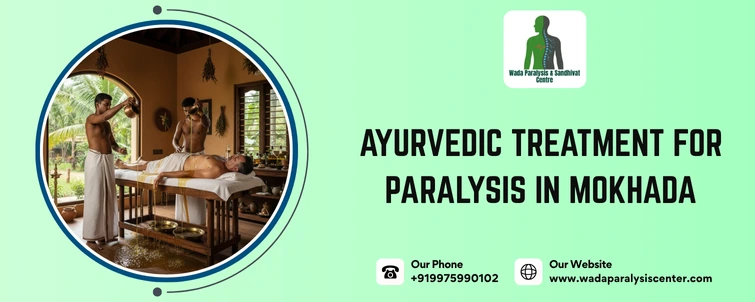



Table of Contents
ToggleParalysis is one of the most challenging conditions that can impact a person’s movement, confidence, and quality of life. In many cases, modern medicine focuses mainly on symptom management, leaving patients searching for holistic recovery solutions. For those residing in the Mokhada region, Ayurvedic treatment for paralysis in Mokhada offers a promising, natural, and restorative approach. Through ancient healing wisdom, herbal remedies, specialized therapies, and individualized care, Ayurveda addresses not just the body but also the mind and spirit.
At Wada Paralysis Centre, patients experience a transformative healing process where Ayurveda combines time-tested therapies with modern rehabilitation techniques. The goal is not only to restore movement but also to balance the body’s vital energies—Vata, Pitta, and Kapha—so that true recovery can begin from within.
In Ayurveda, paralysis is generally associated with Vata dosha imbalance. Vata governs movement and nerve impulses in the body. When Vata becomes aggravated due to improper diet, stress, lifestyle, or injury, it may cause impaired nerve function, resulting in paralysis. Ayurveda refers to the condition as Pakshaghata or Pakshavadha, affecting one side of the body or specific muscle groups.
Ayurvedic treatment for paralysis in Mokhada is based on restoring Vata balance through a combination of internal and external therapies, detoxification, diet regulation, and rejuvenation. This holistic healing process encourages neuromuscular regeneration and supports the body’s natural ability to recover.
Common causes of paralysis from an Ayurvedic viewpoint include:
Before starting Ayurvedic treatment for paralysis in Mokhada, understanding the symptoms is essential for timely treatment. The signs may differ based on the affected body part and severity.
Ayurveda recognizes these symptoms as imbalances that must be treated not by suppression but by natural correction. Addressing the root imbalance helps in both functional and emotional recovery.
Unlike conventional therapies, Ayurvedic treatment for paralysis in Mokhada focuses on the entire being — physical, mental, and spiritual. The process includes detoxifying the body, improving nerve function, strengthening muscles, and restoring energy balance.
Ayurveda relies on personalized diagnosis, identifying one’s unique body constitution (Prakriti) and the disturbed doshas (Vikriti). Based on this, treatments are selected to rebalance energies and repair damaged nerves.
Key principles of Ayurvedic management for paralysis include:
At Wada Paralysis Centre, trained Ayurvedic practitioners combine these treatments with physiotherapy and neurological support to ensure holistic improvement.
Panchakarma is considered one of the most powerful Ayurvedic detox processes. It eliminates toxins (Ama) from the body while rebalancing the doshas. For individuals affected by paralysis, Panchakarma therapy serves as a rejuvenating and rehabilitating process.
The five primary Panchakarma therapies used in Ayurvedic treatment for paralysis in Mokhada include:
These treatments relieve muscle rigidity, restore motor function, and reduce stress, all of which are crucial for recovery.
Ayurvedic herbs are the heart of paralysis management. These potent formulations nourish the brain, strengthen nerves, and reduce Vata imbalance.
Common herbs and formulations include:
These herbs are tailored into decoctions, oils, powders, or tablets based on the patient’s condition.
Wada Paralysis Centre in Mokhada is dedicated to offering specialized Ayurvedic treatment for paralysis in Mokhada with a focus on personalized therapy. Each patient’s body type, age, and medical background are carefully analyzed before treatment planning.
Key therapy highlights include:
Each therapy session at the centre is performed under expert Ayurvedic supervision, ensuring safe, effective, and long-lasting results.
Diet plays a crucial role in maintaining balance and supporting recovery. In Ayurveda, food acts as medicine, and dietary changes can significantly influence healing speed.
Recommended Ayurvedic diet for paralysis patients includes:
Specific herbs like cumin, garlic, and turmeric are encouraged to improve circulation and reduce inflammation. The Ayurvedic treatment for paralysis in Mokhada at Wada Paralysis Centre includes detailed dietary counseling to support long-term nerve health.
Besides medications and therapies, Ayurveda emphasizes daily routines (Dinacharya) and seasonal habits (Ritucharya) that help maintain harmony in the body.
Patients undergoing Ayurvedic treatment for paralysis in Mokhada are guided to follow:
These routine improvements, combined with Ayurveda and physiotherapy, aid in overall rehabilitation.
At Wada Paralysis Centre, Ayurvedic therapies are effectively integrated with physiotherapy. This dual approach stimulates nerve recovery, enhances body movement, and prevents muscle atrophy.
The combination helps patients regain control over their limbs faster. It also improves flexibility, balance, and energy flow through synchronized exercises and Ayurvedic body therapies.
This makes Ayurvedic treatment for paralysis in Mokhada a truly comprehensive healing journey rather than just symptom management.
Patients who undergo Ayurvedic treatment for paralysis in Mokhada at Wada Paralysis Centre often experience profound improvements in both physical and emotional well-being.
Key benefits include:
Unlike temporary relief provided by modern drugs, Ayurvedic treatments offer sustained recovery through detoxification, rejuvenation, and lifestyle balance.
The Wada Paralysis Centre is known for providing trusted Ayurvedic treatment for paralysis in Mokhada that blends authentic Ayurvedic wisdom with scientific precision.
Highlights of the centre:
The centre’s philosophy is rooted in helping patients achieve complete physical and spiritual restoration through Ayurveda.
Many patients have regained movement and confidence through Ayurvedic treatment for paralysis in Mokhada at Wada Paralysis Centre.
Patients report:
These stories reflect the power of Ayurveda when delivered with dedication, compassion, and clinical expertise.
Recovery from paralysis is a gradual process. Ayurveda encourages patience, consistency, and commitment. After completing Ayurvedic treatment for paralysis in Mokhada, patients are guided through long-term rehabilitation programs to maintain stability and prevent relapse.
These include:
Over time, patients often achieve remarkable improvements, regaining both physical independence and inner peace.
The essence of Ayurvedic treatment for paralysis in Mokhada lies in harnessing the healing intelligence of nature. Ayurveda doesn’t merely target symptoms—it seeks to awaken the body’s innate capacity to heal. The oils, herbs, massages, and therapies used in this holistic system are designed to reestablish balance within every cell, nerve, and organ.
At Wada Paralysis Centre, this ancient healing science is brought to life through personalized care that heals deeply and holistically.

Wada Paralysis Centre in Mokhada is known for its specialized Ayurvedic treatments that help patients recover from paralysis using natural therapies, herbal medicines, and Panchakarma techniques.
Ayurveda focuses on repairing nerve functions, improving muscle strength, and restoring body balance. While complete recovery depends on the patient’s condition and duration of paralysis, many patients experience significant improvement through consistent Ayurvedic therapy.
The centre provides a range of therapies such as Abhyanga (medicated oil massage), Pizhichil, Basti (medicated enema), Nasya, Shirodhara, and customized herbal medicines to rejuvenate the nervous system.
The treatment duration varies based on the patient’s health, age, and type of paralysis. Typically, a course may last from 21 days to 90 days, with regular follow-up sessions recommended for long-term results.
Yes, all treatments are natural and conducted under the supervision of qualified Ayurvedic doctors. The herbs and oils used are 100% safe and free from harmful side effects.
Yes, the Wada Paralysis Centre in Mokhada offers comfortable stay facilities and food arrangements for patients and their attendants during the treatment period.
The centre treats various forms of paralysis, including hemiplegia (one-sided paralysis), paraplegia (lower body paralysis), facial paralysis (Bell’s palsy), and post-stroke paralysis.
Yes, regular follow-up and lifestyle guidance are essential to sustain the benefits of Ayurvedic therapy and prevent recurrence. The centre provides diet and exercise plans for home care.
You can contact the centre directly via phone or visit their official website to schedule an appointment. Early consultation helps in planning a personalized treatment program.
Yes, the centre offers online consultation services for initial assessments and post-treatment follow-ups, ensuring accessibility for patients across India.
If you or a loved one is struggling with paralysis and searching for a safe, natural, and result-oriented solution, Ayurveda offers new hope. Ayurvedic treatment for paralysis in Mokhada at Wada Paralysis Centre brings together centuries-old techniques, expert healers, and compassionate care under one roof. It’s more than just treatment—it’s a journey toward regaining life, strength, and independence.
With continuous efforts, authentic therapies, and heartfelt healing, Ayurveda helps patients stand again—physically and emotionally—restoring freedom and vitality.
